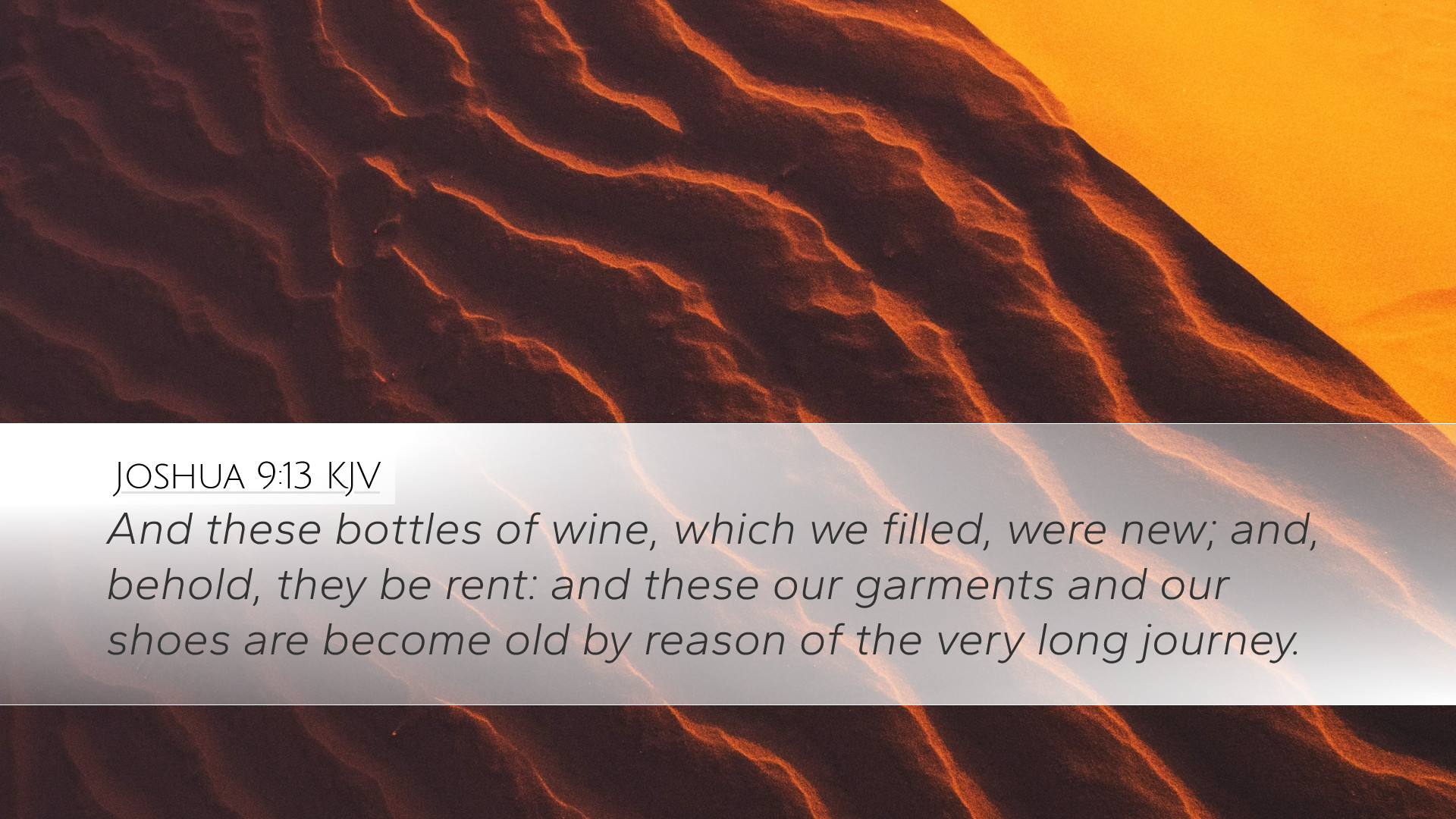Commentary on Joshua 9:13
Joshua 9:13 states: "And these bottles of wine, which we filled, were new; and, behold, they be rent: and these our garments and our shoes are become old by reason of the very long journey."
Introduction
This verse is part of the narrative of the Gibeonite deception, where the Gibeonites feigned being from a distant country to make a covenant with the Israelites. The verse illustrates their preparations and the physical signs intended to convince Joshua and the Israelites of the authenticity of their story. The examination reveals deeper insights into themes of deceit, the importance of discernment, and the consequences of hasty decisions.
Insights from Commentators
Matthew Henry's Commentary
Matthew Henry emphasizes the significance of the Gibeonites' approach. He notes that their strategy was well-prepared, as they used items that visibly supported their tale of a long journey. The new wine bottles, which had become old and rent, symbolize the effort to present a façade that would mislead Joshua. Henry points out that:
- The symbolism of old and new: In biblical contexts, new wine typically signifies joy and the blessings of God, whereas old wine can represent weariness or the remnants of past experiences.
- Deceit in appearances: The Gibeonites skillfully manipulated material possessions, illustrating how outward appearances can be deceiving.
- Need for discernment: This incident serves as a reminder for believers to seek divine wisdom and discernment in making decisions, especially when confronted with attractive but misleading presentations.
Albert Barnes' Notes on the Bible
Albert Barnes highlights the practical aspects of the Israelites' encounter with the Gibeonites. He remarks that the Gibeonites’ worn garments and old shoes were a potent part of their deceitful scheme. Barnes makes the following observations:
- The journey's implication: The scruffy appearance of the Gibeonites’ attire was a calculated tactic to evoke compassion and credibility.
- Critical thinking in faith: Barnes encourages readers to engage their reason alongside faith. The Israelites failed to consult God, reflecting a common weakness in human judgment.
- Old versus new: He associates the state of the Gibeonites' clothing with the concept of sacrifice, indicating their willingness to sacrifice their comfort for survival through deception.
Adam Clarke's Commentary
Adam Clarke takes a historical approach, discussing the context that motivated the Gibeonites to such deception. He reasons that:
- Fear of destruction: The Gibeonites, aware of Israel's reputation for victory in Canaan, resorted to dramatic strategies to protect themselves from impending destruction.
- The providence of God: Clarke posits that God’s providential care over the Israelites was evident, yet their failure to seek divine guidance led them to make a covenant that would later bring trouble.
- Lessons on trust: Clarke notes the importance of trust in God's direction over the reliance on physical evidence. The Gibeonites used deceptive means, but the faithful should lean on the spiritual truths presented through God’s Word.
Theological Implications
The events surrounding Joshua 9:13 provide a fertile ground for examining various theological implications:
- The danger of appearances: As Christians, the call is to be vigilant. The truth often lies beyond what the physical eye can perceive, encouraging deeper spiritual discernment.
- Importance of seeking God’s guidance: The narrative underscores the necessity for prayer and divine consultation before making any significant commitments.
- Grace and deception: Despite the deception, God would later show grace to the Gibeonites, highlighting God's overarching mercy and plan of redemption even for those outside of the covenant community.
Practical Applications
For pastors, students, theologians, and scholars, this verse and its commentary invite reflection on several practical applications:
- Evaluate situations carefully: Look beyond outward appearances and question motivations, recognizing the subtleties in human interactions.
- Encourage prayerful consideration: Establish practices within congregations to encourage seeking God’s will in decision-making processes.
- Teach on grace and truth: Use the Gibeonite story as a teaching point on how God's grace can cover mistakes stemming from human limitations.
Conclusion
Joshua 9:13, within the larger story of the Gibeonites and the Israelite conquest of Canaan, serves as a teaching tool about the complexities of trust, discernment, and the often-deceptive nature of appearances. The insights drawn from Matthew Henry, Albert Barnes, and Adam Clarke not only illuminate historical context but also offer enduring lessons relevant for contemporary faith contexts. As leaders, students, and scholars engage with this passage, may it deepen their understanding and lead to thoughtful application of biblical principles in their lives and ministries.


